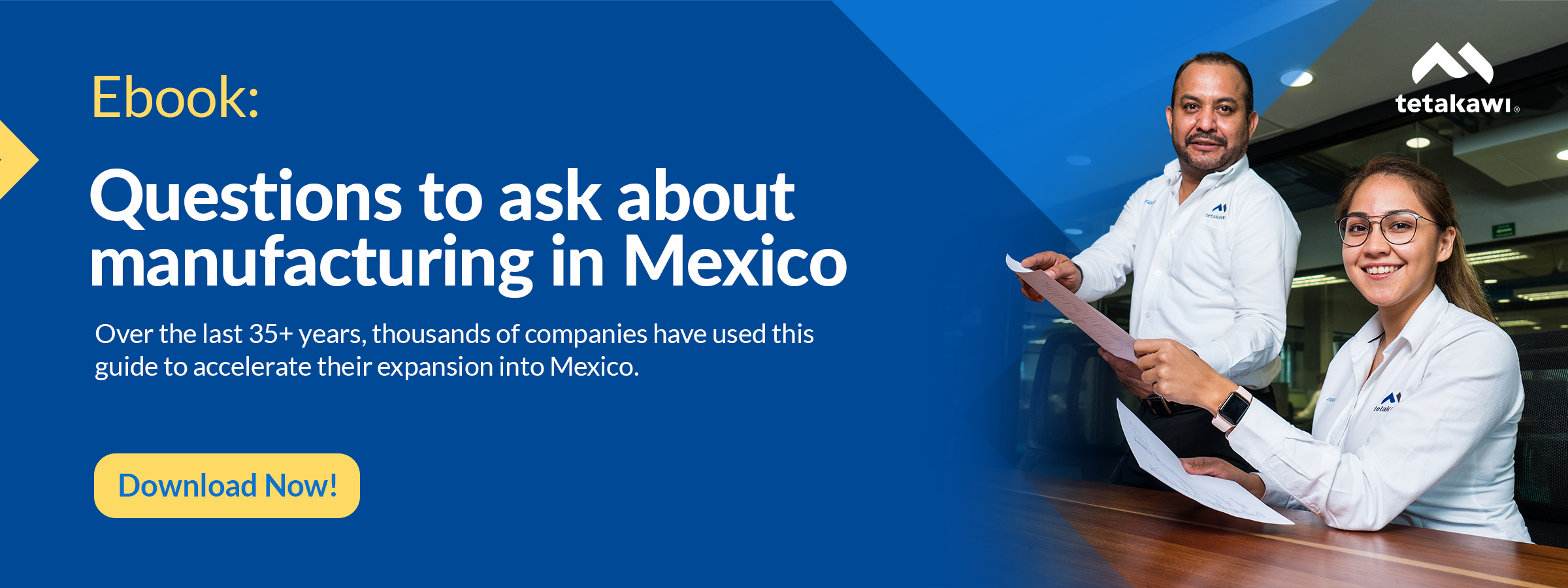Mexico’s reputation as a manufacturing hotspot has driven an influx of interest from companies looking to rebalance their global footprint. The demand for nearshoring in Mexico is being driven by manufacturers’ search for labor stability and the ability to shorten the time it takes to get goods to customers. However, as every company recognizes – particularly those companies now leaving locations in southeast Asia – every location carries its own business risks.
In general, business risk usually occurs in one of four ways: operational risk, compliance risk, reputational risk, and strategic risk. Being aware of the nuances of how this risk might materialize for your company can help company leaders decide if Mexico is the right location for their needs and develop strategies to lower their risk.
Of course, when considering the risks of doing business in Mexico, it's crucial for companies to develop effective risk mitigation strategies. These strategies serve as a proactive approach to anticipate and address potential challenges before they escalate. One key strategy is to partner with a seasoned provider like Tetakawi–we have extensive experience in navigating Mexico's regulatory landscape.
By leveraging Tetakawi's expertise, companies can streamline their entry process, ensure compliance with legal requirements, and mitigate operational risks associated with starting and running a business in Mexico. Additionally, implementing robust internal controls, conducting thorough due diligence on suppliers and partners, and investing in employee training on compliance and security protocols can further enhance risk management efforts. Through a comprehensive approach that combines external support and internal best practices, companies can effectively mitigate risks and maximize their success in the Mexican market.
Potential operational risks in Mexico
Operational risk can emerge through flawed processes or systems as well as external events that impact business operations. Certain operational risks are inherent to a business, regardless of location. Equipment can break down, processes can be flawed, natural disasters can strike anywhere. When considering a move to Mexico, two risks in particular are often front of mind for company leaders: personnel challenges and physical security.
Employees
When it comes to employees in Mexico, employers are bound by the Federal Labor Law, which sets regulations for hiring, managing, and terminating employment. In general, these rules are similar to those found in the U.S., Canada, and other locales, but there are unique differences. Understanding basic requirements around the workweek, overtime, benefits, and termination can establish a strong foundation.
As in any country, good hiring practices and retention strategies designed to attract and keep top candidates can help reduce the risk of expensive employee churn or of hiring bad apples. In many cases, businesses opt to partner with a shelter service provider who can provide HR services. Insight into local market norms can significantly strengthen a company’s hiring and retention strategies.
Security
Physical security is a leading concern for foreign investors evaluating sites in Mexico. Crime and incidents of violence have increased in certain states in recent years, eliciting travel advisories from other governments.
For businesses, concerns are generally around the transit of goods, although cybercrime is emerging as a growing risk, much as is found in other companies. A survey from the American Chamber of Commerce in Mexico found that the biggest threat facing companies operating in Mexico is around the security of warehouses and cargo being transported. That said, 73% of those companies surveyed reported that these risks had had no impact on their distribution plans or growth in Mexico. Instead, companies account for these potential threats by operating in gated industrial parks with security features as well as working with a trusted loss protection team. Nearly three-quarters of the survey respondents reported spending between 2% to 4% of their annual budget on security.
Logistics
One of the most significant concerns about doing business in Mexico comes from uncertainty over the future, especially with regard to ongoing discussions around U.S. border logistics. However, the USMCA trade agreement sets requirements for member countries to provide quick, clear customs and border inspections as well as avenues through which member countries can navigate these challenges.
Moreover, even as some border crossings become more complex, others are opening up. In fact, the numerous avenues through which companies are able to get goods into the United States and Canada – through multiple states via highway, railway, deep-sea port, and air – is one of its biggest advantages. This redundancy gives companies added assurance that they can get goods to market.
Compliance risks in Mexico
As in most other countries, business in Mexico is regulated by a range of enforceable federal laws. Companies benefit from having partners in place to help navigate nuances around startup requirements, labor laws, environmental regulations, and financial management.
Startup Requirements
Dealing with the paperwork required to start and operate a business in Mexico can be arduous for any company. Registering with the authorities, getting electricity, securing construction permits, filing property, and enforcing contracts are just some of the necessary bureaucracy-heavy procedures that companies must go through. The government departments of Mexico have a reputation for being notoriously slow when it comes to processing and granting trade permits, and this can be an issue if you need to move quickly or have time-sensitive investments. Many companies avoid this risk by launching under the legal umbrella of an IMMEX-registered shelter service provider.
Labor laws
Mexico’s Federal Labor Law governs most every aspect of employment, but these laws can be tricky to navigate. It’s also important to note that Mexico’s labor laws favor employees. In the event of a dispute, it’s essential that companies have clear documentation demonstrating compliance with all regulations.
Taxes
Paying taxes can be a labor-heavy task in Mexico. Though there are only six types of payments to be made, doing so usually takes over 200 hours of a business’ time per year. This is primarily due to the need for in-person interactions with the state and reliance on hard-copy documents. Mexico’s tax requirements also entail a strict recording of transactions to properly trace all transactions, money, and beneficiaries. The requirements can swiftly become overwhelming for the individuals in charge of company finances.
Environmental regulations
SEMARNAT serves as Mexico’s primary federal environmental agency and has responsibility for ensuring companies’ compliance with environmental protections. These environmental laws protect and conserve natural resources and ensure environmentally safe management of materials, among other factors. Manufacturers will need to secure permits and authorizations and maintain documentation from SEMARNAT for certain activities.
Reputational risk in Mexico
Nearshoring in Mexico has become an increasingly popular option for companies seeking a competitive advantage. However, companies do run certain reputational risks by launching in Mexico. While Mexico has made strong strides in increasing worker protections, the presence of organized crime in Mexico has created a troubling picture around human rights. In fact, legislation passed in 2023 in Germany requires companies operating in Mexico – including automakers like Audi and BMW, among others – to perform due diligence that ensures all parties within their supply chain are respectful of human rights.
In addition, as more companies commit to sustainability, a location in Mexico could potentially pose a reputational risk. While Mexico was one of the first countries to set targets pass a law on climate change, it has fallen far short of its own greenhouse gas reduction goals. That said, many companies in Mexico opt to operate plants that recycle water, make use of solar energy, and otherwise conserve natural resources.
Mitigate strategic risk by operating in Mexico
For many companies, moving manufacturing into Mexico is a strategic decision to alleviate risk. By moving production closer to customers in the Americas, companies are often able to reduce costs and shipping times. As noted above, Mexico also provides companies redundancy in how they can get goods to those markets as manufacturers do not need to rely on ocean freight alone. In addition, Mexico provides a stable source of labor for companies that operate in countries facing severe manufacturing labor shortages.
While it’s impossible to eliminate risk, there are a number of steps companies can take to mitigate it. One of the most effective steps is to work with a partner adept at navigating Mexico’s regulatory environment. For more than 35 years, Tetakawi has been helping companies mitigate risk in their approach to launch and ongoing operations in Mexico. To learn more about how we can help you, contact Tetakawi today.
Subscribe
Sign up and stay informed with tips, updates, and best practices for manufacturing in Mexico.







